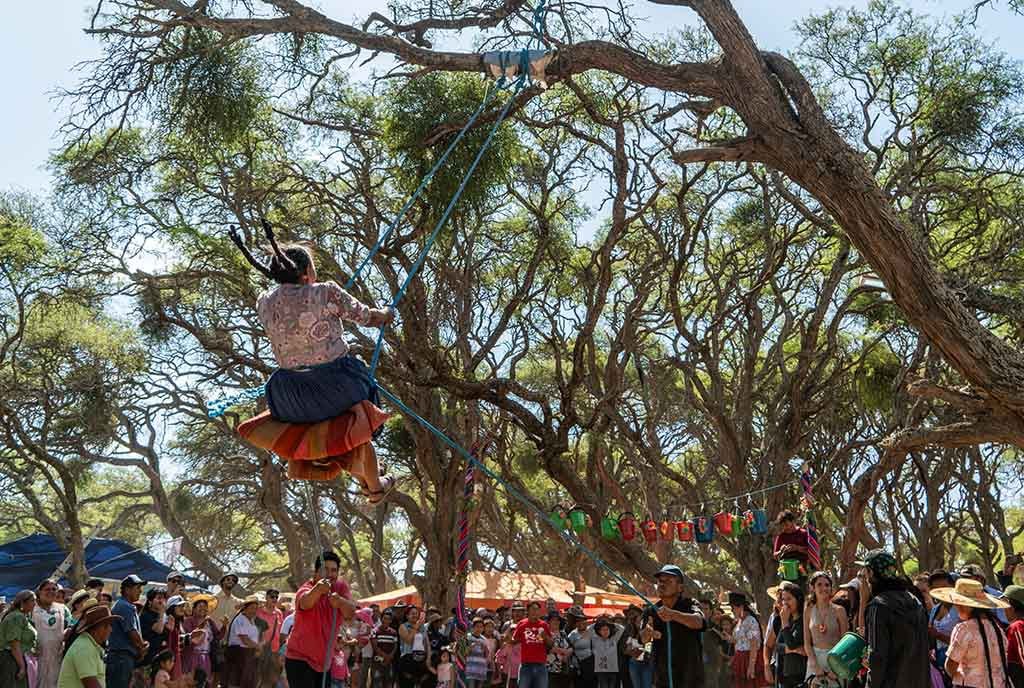Here in the Cochabamba Valley, days after Día de los Muertos (Day of the Dead), Bolivians continue communing with their dead. This is one of many cultural rituals common in the small, majority-Indigenous country—wedged between Chile, Argentina, Peru, and Brazil—of roughly 12 million people. On any given day, you can hear people speaking Spanish, Quechua, Aymara, and Guaraní on the streets; and Afro-Bolivian communities and many other distinct Indigenous groups from the Amazon region live in the more rural areas.
Bolivia may be small, but when it comes to the solidarity economy, it plays an outsized role. It is, for instance, one of the first nations worldwide to legally recognize the rights of nature. Back in the San Francisco Bay Area where I’m usually based, I work with the Sustainable Economies Law Center to support projects that redistribute wealth, democratize governance, and steward communal resources. As I have seen in the months that I have spent in Bolivia, there is much US solidarity economy activists can learn from our Latin American counterparts.
A Movement Rooted in Indigenous Practice
The ritual I witnessed in Cochabamba was once widespread in Quechua-speaking areas, but it is now mostly found in pueblos (small towns). In this ritual, people build wallunk’as (swings), up to 60 feet tall, which symbolize a gateway between the living and dead, and the continuity of life and fertility during planting season.
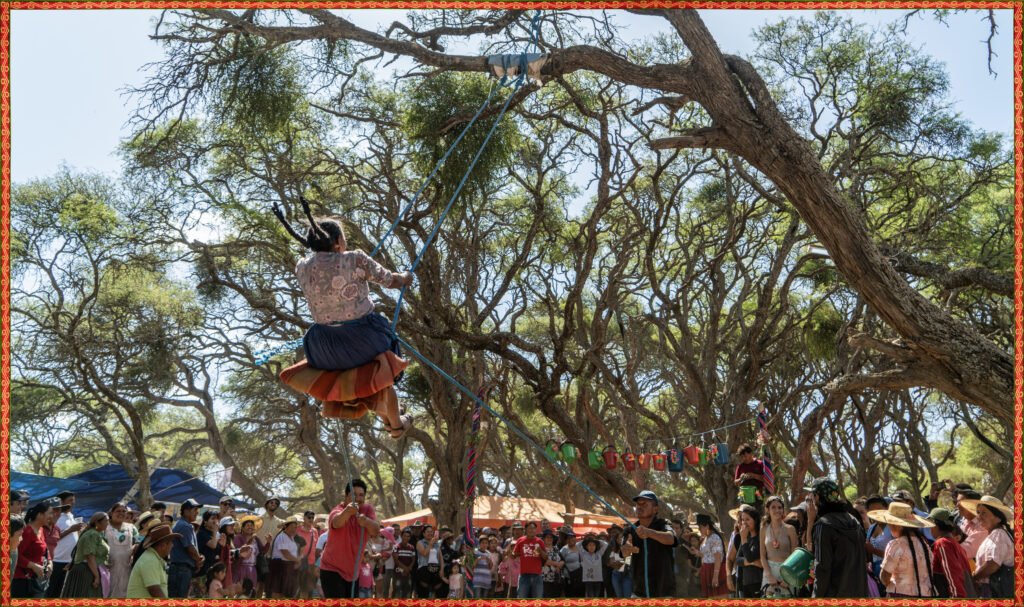
Mast’akus (large tables) filled with food, drink, and t’anta wawas (bread babies) to feed the souls of the dead, are spread throughout the festival grounds. More than 15 years ago, my friend Malena Rodriguez García helped revitalize a less Catholic, more Indigenous way of making t’anta wawas and the mast’akus. She has continued to help organize them.
As I stand in the shade of a patch of trees and take in the joyful sight of such a hugely successful small-town festival, I have this nagging feeling something is missing. Where is the Coca-Cola banner? Or the Paceña beer representatives passing out free merchandise? Where are all the corporate logos and banners, which hardly any public event in the United States is without?
Not a single corporate sponsor can be seen. How did they do it?
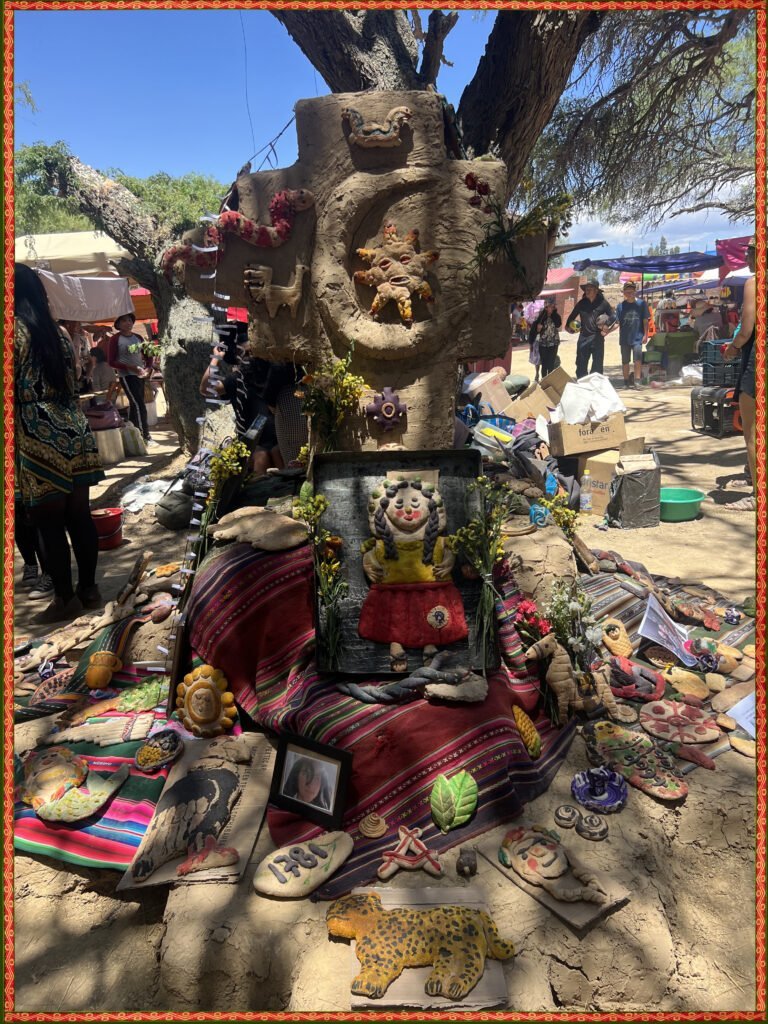
I ask Rodriguez García about this. She explains that a communally elected festival organizer called the pasante organizes community resources to make it happen. “It is a rotating community way to generate economic resources to cover the expenses of the party.”
Ayni—an Andean cultural value of reciprocity and mutualism—motivates Bolivians to support one another.
The scale of this party—at its peak, attended by roughly 5,000 people—the fact that it had been happening for over 30 years, and that it is all supported by volunteer labor and community resources was unbelievable to me. This was the first of many moments where I’ve witnessed Bolivians practicing interdependence, mutuality, and self-governance to meet community needs.
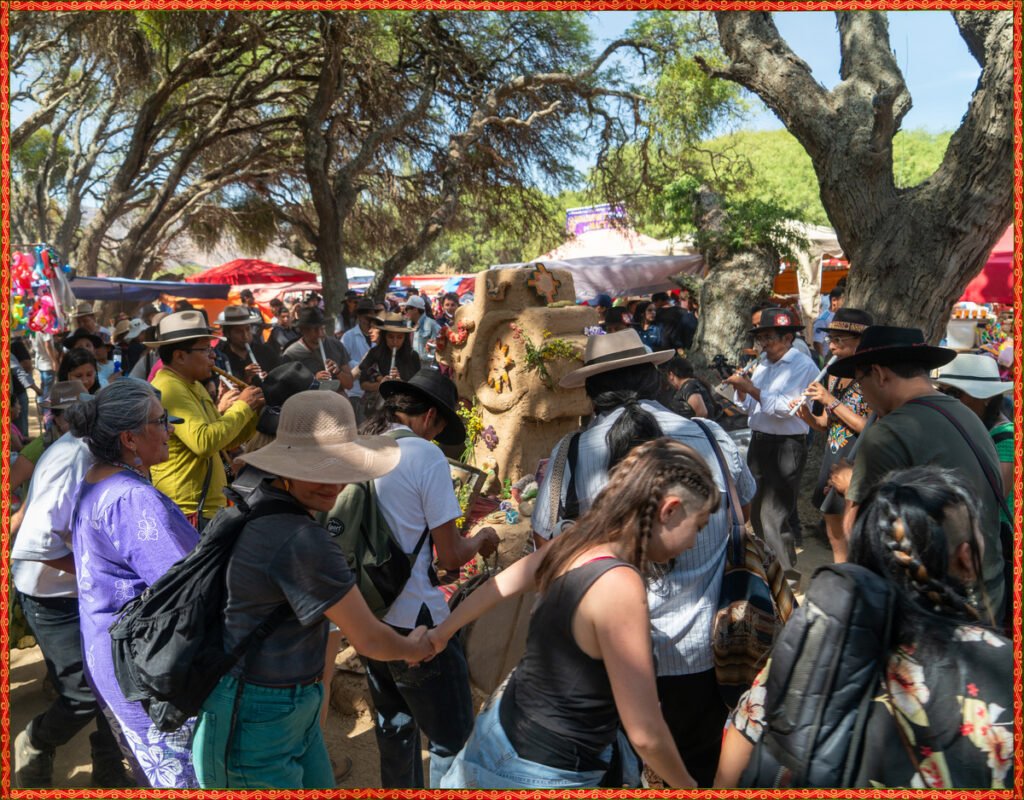
But was this wallunk’as festival a product of the solidarity economy or simply a cultural event? Canadian scholar Gretchen Ferguson, whose dissertation on Bolivia defines the solidarity economy in Latin America as “economic activities based on reciprocity and mutual benefit—collective initiatives undertaken by a group of people with common interests. As such, the conceptualization of the solidarity economy tends to emphasize mutual support between small producers, workers, and people working in the informal (popular) sector.” The practices and strategies of the solidarity economy movement in Bolivia have a long, rich history, based in cultural values.
Solidarity before Economy
Ayni—an Andean cultural value of reciprocity and mutualism—motivates Bolivians to support one another. José Choque, a dear Bolivian friend, once explained ayni to me as, “Tú me das, yo te doy.” (“You give to me. I give to you.”) This is ayni distilled down to its essence.
I like to think of ayni as an infinity symbol—energy flowing in and out between two poles that could represent two people or two communities, with unending possibilities of combinations. Choque explained to me that this value helps us to live in harmony and balance with our community and the more-than-human world because it is a ritualized practice of ongoing giving and receiving. When ayni is forgotten, our connection to each other and to the land is lost. When we lose those connections, the balance is gone, and we destroy each other—and our means of survival.
Throughout a person’s life, others in the community assume the responsibility of pasante (rough translation: assistant) so that the entire community can enjoy the festival or whatever communal event needs to be organized. This job will come around to almost everyone in the community one day, and it will be an honor to finally give back after years of receiving. The few accept the burden of organizing so that we all may enjoy.
Rodriguez García explained: the work of organizing the wallunk’as festival begins with the pasante. The pasante is unpaid, and responsible for organizing, paying for, or sponsoring the festival or party. The pasante from the year before is often the person to pick their successor. Once a person is picked, it’s up to them to delegate work to others—subpasantes—and communicate with the community and vendors.
When I spoke to Rodriguez García about her role in co-organizing the making of the t’anta wawas, she expanded further: “This also transcends individuality because generally people who belong to different communities are chosen. So, there are also different communities that get involved in the process. And they cover the expenses financially on a community basis rather than individually.” So the pasante is never alone.
Bolivian culture has made it clear to me that solidarity requires ongoing cultivation and organizing. Nearly every major festival, holiday, wedding, and political manifestation is self-organized by the people. They are always organizing something. The relationships never run dry. Bolivians are deeply invested in keeping these kinship networks flowing because they know, from recent experience and throughout history, that the state is not there to protect, provide, or support them in times of need.
The Government Role
In 2006, Bolivia’s first Indigenous president Evo Morales and the MAS (Movimiento al Socialismo or Movement to Socialism) party led the country during a rewriting of the constitution. They officially adopted the economía plural (plural economy) as one of the four foundations of Bolivia’s economy. The economía plural consists of community enterprises, social cooperatives, and collectives practicing mutual aid and reciprocity, often with non-monetary exchange—akin to the solidarity economy framework. Another major change recognized and created frameworks for self-governance, focused on the department (state) and local levels.
How did the government come to enshrine the importance of Indigenous self-governance practices and recognize the importance of the community solidarity economy in the constitution? Over decades, from the 1980s through the 2000s, Indigenous communities and campesinos (rural residents) built community power by creating coalitions of cooperatives, collectives, and community organizations that demanded recognition of Indigenous values and envisioned an economic model and governance practices that centered decolonization.
“Currently, being Indigenous and belonging to popular groups are central elements of Bolivian identity,” write Bolivian scholars Fernanda Sostres and Ivonne Farah. In addition to the Indigenous value of ayni, cultural practices like mita (mandatory shifts of communal work) and minca (when community members offer free labor for the benefit of the community) support community self-determination and land regulation.
Sostres and Farah estimate that as of 2012 an estimated 1,500 cooperatives operated throughout the country, with three million active members. That’s a quarter of the population. And these are exactly the organizations that advocated for recognition of the community economy in the constitution.
Bolivians never stopped organizing their communities for the right to control their resources and markets.
Sostres and Farah write, “The importance of organizations and social movements in Bolivian society is explained by the continuity of solid community fabric, and their plural forms of political representation and economic organization. The campesino and Indigenous sector is part of this trajectory.”
Challenges to Anyi
Unfortunately, while the Bolivian constitution of 2006 and subsequent laws backing a solidarity economy rooted in Indigenous cultures create the possibility for a huge shift, Bolivia still exists in a world economic system that remains dominated by neoliberalism. Moreover, even when MAS has been in power, the government has often shied away from its economía plural commitments; often choosing instead to invest resources in extractive, state-run enterprises.
Sign up for our free newsletters
Subscribe to NPQ’s newsletters to have our top stories delivered directly to your inbox.
By signing up, you agree to our privacy policy and terms of use, and to receive messages from NPQ and our partners.
Every Bolivian I have spoken with shared varying degrees of disappointment and anger with how the coalitions and social movements championing a solidarity economy were marginalized by the MAS government once they took power. Despite these disappointments, the struggle continues.
Earlier this year, my husband Mateo was called on by the neighborhood water cooperative to attend a protest. It’s common in Bolivia for neighborhood cooperatives to control resources like water and gas. But now, the municipality of Tiquipaya in Cochabamba wants to take over water management—and subcontract out the work to a private company. The people of Montecillo—our neighborhood—were not going to let that happen and took to the streets to let their voices be heard. So far, the cooperative has prevailed.
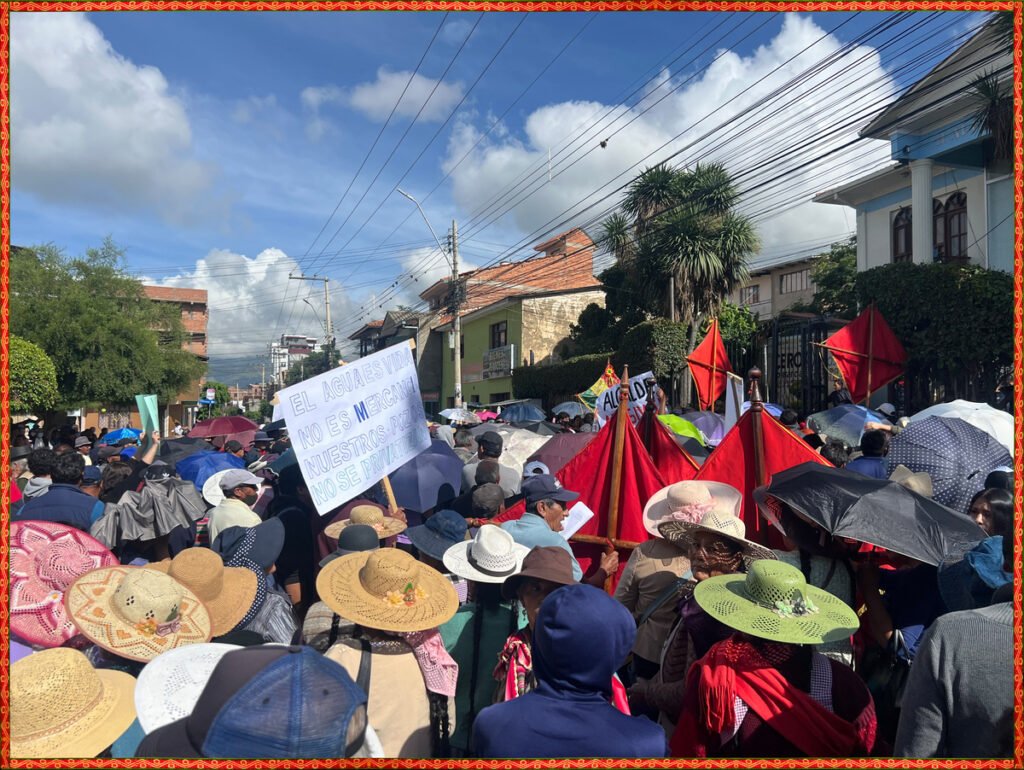
The story of my neighborhood water cooperative is a common story across Bolivia. Despite often lukewarm official support, Bolivians never stopped organizing their communities for the right to control their resources and markets.
Culture, Economy, and the State
As noted above, in Bolivia, economic solidarity precedes the state. Many of the ways Bolivians take care of their needs are not even legible to the state. On paper, Bolivia is a poor country. Recently, however, it’s been relatively stable compared to its neighbors Chile and Argentina, in part because of how resilient local community economies have been, buttressed by traditional networks connected through ayllus.
Noemy Flores—a musician and healer based in Cochabamba but originally from a rural mining community—describes the ayllu as “not only a group of people who organize themselves…but also the community of nature.”
Imagine how much more depth and sustainability we could build into our movements when we center Indigenous economics.
Traditionally, ayllus are collections of communities that are spread throughout many different ecological zones, often vertically—jungle, altiplano (mountainous regions), valley, and desert all are inhabited by one ayllu. Within each ayllu, people trade and support each other, especially in times of need. When there’s a drought in the high Yungas (mid-altitude jungles), they can depend on folks in the altiplano whose llamas, alpacas, and potatoes are all fine. That diversification of ecological niches allows for ayllus to be much more stable, sustainable, and self-contained.
Flores, along with other migrants, are recreating ayllus in the urban center. She describes it as “recovering affirming ancestral knowledge.” They gather to sell or barter items like herbal medicine, organic fruits and vegetables, artisan clothes and jewelry, and homemade food. Many of them are also part of autochthonous music groups. Through the music, they reinforce cultural values of living in harmony with Pachamama (Mother Earth) and each other.
Lessons for US Activists
I’m incredibly grateful to have been a welcomed guest and given space to be immersed in Bolivian life and culture for long enough to glean some important lessons. When we see communities working to revitalize and maintain traditional Indigenous ways of being, we see solidarity economics in action.
I believe we’re entering a new era of Indigenous leadership and cultural revitalization in the United States. But the solidarity economy movement could do much more to seek out and uplift Indigenous economic and cultural practices. Imagine how much more depth and sustainability we could build into our movements when we center Indigenous economics.
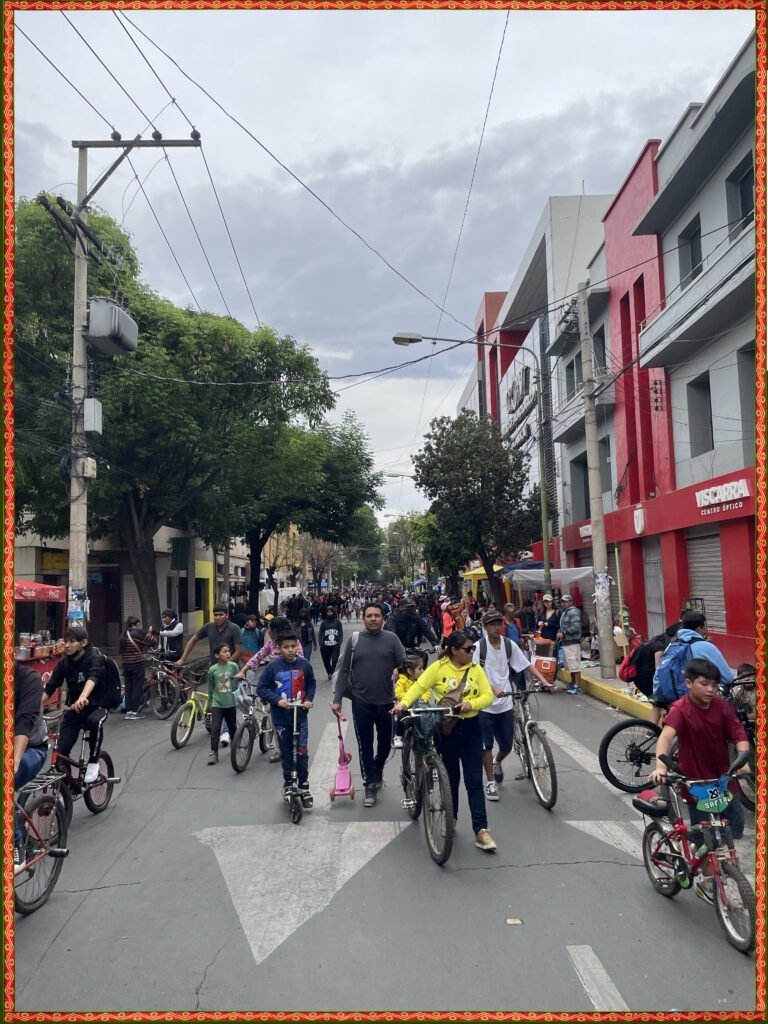
Some key lessons that I take from my Bolivian counterparts:
- Relationships over Everything
Bolivians prioritize relationships. That priority creates a natural practice of solidarity. There’s even a special word people have for the person you prioritize to buy your goods and services from—casera or casero. It’s a term of endearment that vendors and their patrons call each other.
In Bolivia, business is more than a transaction; it’s an opportunity to build a relationship. I think this sentiment is growing in the Western networks of the solidarity economy. By learning some of the ways Bolivians provide care and nourishment to their communities, we might inspire new ways of engagement in solidarity economy in the United States and beyond.
Bolivians love to create moments of collective joy. I’ve experienced local food fairs that highlight Indigenous cuisine, quarterly holidays where the streets get taken over by bikes and pedestrians, a month of Carnaval activities, and more. These gatherings required months of planning and gathering of community members. Art and culture making facilitates the ongoing practice of solidarity.
Back in the United States, we need ongoing, long-term investment in art and culture building events. What I’ve learned from Bolivians is that investment doesn’t automatically mean money. Investment can be our labor, our time, our resources, and our relational connections.
Often, political activity in the United States, particularly among progressive activists, focuses on government policy. Government policy, of course, is important, but a lesson from Bolivia bears emphasis: the state does not care about you, has no interest in your survival, and will not be there to save you when shit hits the fan.
In Bolivia, I’m reminded how most people in the global majority understand this truth from lived experience. Marginalized people in the United States also understand this; but we’re all still constantly fed the lie that governments are there to protect us. A thriving solidarity economy, as in Bolivia, should take care of the needs of the community to such a degree that everyone believes that we take care of us.
The Value of Cultural Grounding
Modern capitalism has organized our labor, our foodways, and our systems of care in such a way that the labor is cheapened. As scholars Raj Patel and Jason Moore write,“Cheapening marks the transition from uncounted relations of life-making to the lowest-possible dollar value.”
The rotating work of meeting community needs, as a pasante or even dirigentes (rural appointed officials), is hard work. But people performing these roles are honored for the work that they do—and that makes a big difference in the sustainability of the practice.
At the beginning of 2024, my family and I witnessed several instances of the changing of dirigentes. We saw groups of men wearing colorful ponchos stand in front of their community to be recognized for the free labor they provided the year before. They burned offerings to Pachamama in thanks and then passed the torch to the incoming group.
Back in the United States, we must create rituals to honor the work of people building and maintaining our community economies.
